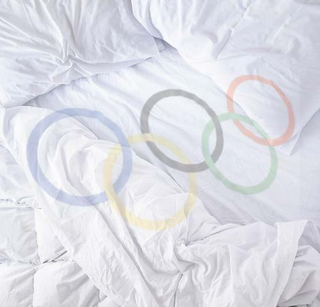 We all know that getting a good night’s sleep can really make a big difference the next day. You wake up feeling refreshed and energized. Your mind is clear and you can take on the day. And that’s just for the average Joe.
We all know that getting a good night’s sleep can really make a big difference the next day. You wake up feeling refreshed and energized. Your mind is clear and you can take on the day. And that’s just for the average Joe.
Sleep can also make a critical impact on our ability to perform on an athletic basis. And that’s more important than ever for the top-tier athletes who are taking part in the Sochi Olympics.
“The same way that a world-class athlete needs nutritious food to fuel their body, they need proper rest for peak performance,” says Michael Grandner, PhD, an Instructor in Psychiatry and member of the Center for Sleep and Circadian Neurobiology at Penn. "Insufficient and/or poor quality sleep is associated with weight gain, metabolic dysregulation, fatigue, slowed performance, impaired decision making, and many other outcomes that can impair athletic performance. Also, healthy sleep is important for muscle recovery and repair after exertion, so it may be important for athletes to get good quality sleep in order to avoid injury and improve performance.”
Research has shown that even one extra hour of sleep can enhance athletic performance. Dr. Grandner points to a 2011 study that found extending sleep, even by one hour, in college basketball players resulted in faster sprints and more accurate shots.
“This study was done over a period of several weeks, so it definitely points to the need for adequate sleep over an extended period of time, not just a quick fix the night before a competition,” he says.
Grandner notes that while elite athletes such as those performing in the Winter Olympics have long been prepped for competition with vigorous workout schedules and supervised by nutritionists, adding sleep maintenance to their routines is relatively new.
And for some, it’s catching on in a big way. U.S. Figure Skating Team member Jeremy Abbott went as far as bringing his own bed to Sochi to make sure he got quality sleep during the games.
“It’s only been in the last few years that coaches and trainers at all levels in many different sports have embraced the idea that monitoring an athlete’s nightly bedtime routine plays a vital role in game day outcomes.”
The reverse is also true, that getting in a workout can improve your sleep. The 2013 “Sleep in America” poll, organized by the National Sleep Foundation, found that people who report they exercise on a consistent basis have better sleep than self-described non-exercisers even though they sleep the same amount each night.
"Your body is meant to move. Getting the right type and amount of movement helps your body do what it was built to do, and that includes sleeping," Grandner told CBS News in an interview right after the 2013 poll was released.
“There is definitely a positive cycle between getting a good night’s sleep and performing well athletically,” he says. “We live in a society where sleep is often last on our health check list. Be good to your body, including making time for sleep, and your body will be good to you.”
Grandner recommends the following for anyone training for an athletic competition, whether it’s the Olympics or a 5K:
- Get adequate sleep: Try to get between 7-8 hours of sleep each night.
- Sleep consistently: Try to wake-up and go to bed at the same time each night as you train.
- Consider a nap: Naps can help improve alertness if taken in short 20–30 minute increments (as long as you don’t have problems getting to sleep each night).